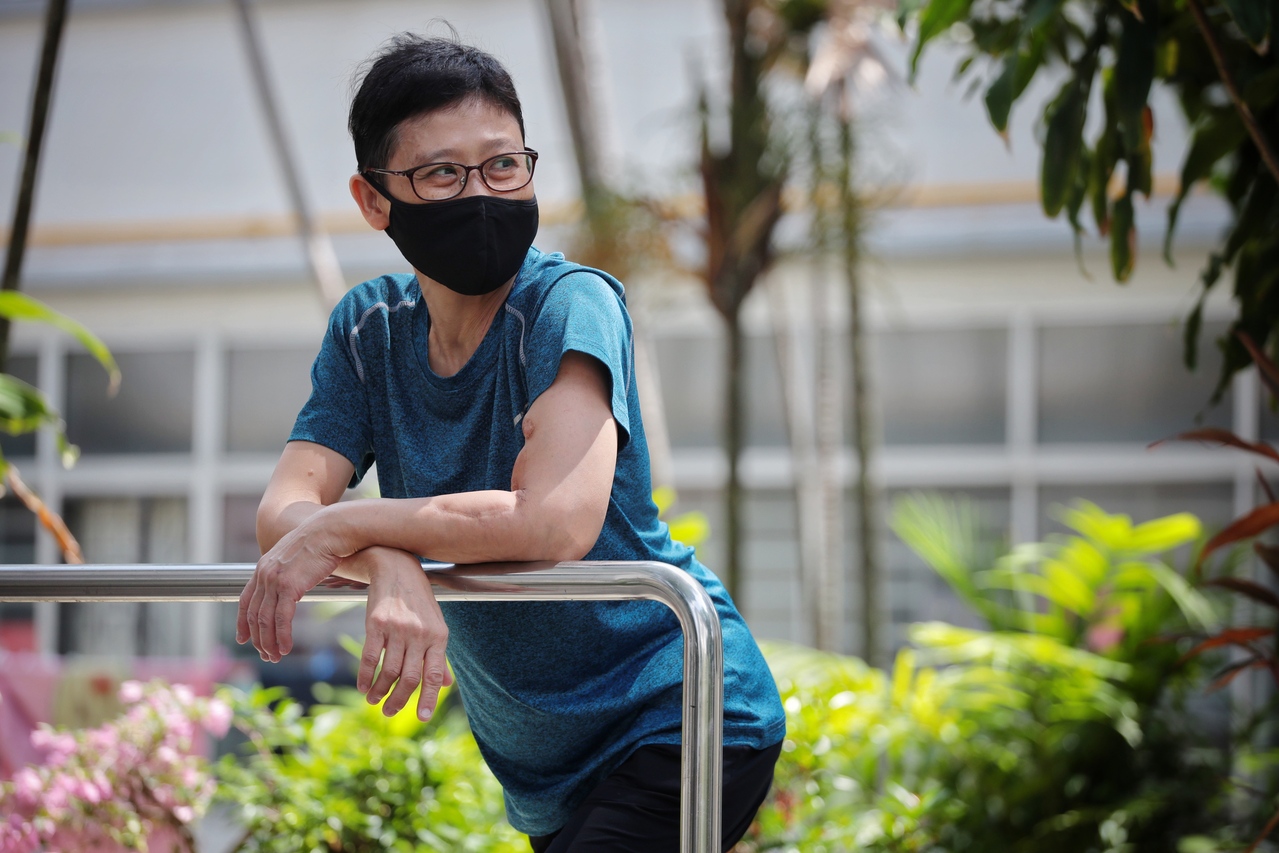New lease of life for recovered Covid-19 patient in Singapore after kidney transplant
Sign up now: Get ST's newsletters delivered to your inbox

Madam Ong Bee Ai felt like her life had collapsed when she found out in 2016 that she had IgA nephropathy.
ST PHOTO: JASON QUAH
Follow topic:
SINGAPORE - Madam Ong Bee Ai was overjoyed when the Singapore General Hospital (SGH) told her in April last year (2020) that she was finally receiving a kidney transplant after a four-year wait.
But the hawker's joy turned to devastation when SGH later informed her she was unable to have the transplant after a Covid-19 swab test revealed she had contracted the virus.
Madam Ong, now 52, who used to run marathons and practise taekwondo, felt like her life had collapsed when she found out in 2016 that she had IgA nephropathy, a condition that left her with just 5 per cent kidney function.
This meant her kidneys were limited in their ability to clear waste and regulate the water balance in her body.
As a result, Madam Ong had water retention and vomited often; her weight plummeted from 58kg to a mere 38kg.
She needed to undergo dialysis thrice a week, with the treatments costing $3,000 a month.
A kidney transplant would improve her quality of life, but she was able to undergo surgery only in January this year after she recovered from Covid-19.
Dr Ho Quan Yao, a consultant at SGH's department of renal medicine, explained that after a kidney transplant, patients have to take medication to control their immune systems to prevent their bodies from rejecting the kidney.
He said: "This is perhaps when the doses of medication are higher and the degree of immunosuppression is probably more intense. If the transplant is not urgent or life saving, it's probably better to treat the underlying infection."
Dr Jasmine Chung, a consultant at SGH's department of infectious diseases, said the hospital makes sure that donors and recipients of transplants are not carrying the Covid-19 virus.
She said: "(This is) so they won't have the possibility of passing (the virus) to staff or other patients in the ward."
SGH has a rigorous Covid-19 screening protocol in place for organ donors and recipients.
Dr Ho said: "They will have to be asked questions on whether they have specific risk factors, for example, were they exposed to any clusters, were they put on home isolation?"
Patients are also reminded to abide by public health measures such as wearing a mask, washing their hands and safe distancing, Dr Chung said.
After her brush with Covid-19, Madam Ong received another call from SGH last November informing her of another possible organ match. But she lost out again because she was second in line for the donor kidney.
When she was called up by the hospital for the third time on Jan 18, Madam Ong said: "I told myself, this time will be the jackpot for me. I will receive it."
She was right. On Jan 19, she became what is believed to be the first recovered Covid-19 patient to receive a transplant in Singapore.
After her operation, Madam Ong said, she has been able to enjoy more time with her brother and two sisters. "No more dialysis means I get back 12 hours (a week). I can go out with my family any time," she said.
What is kidney failure?
Kidney failure occurs when a person's kidneys stop functioning properly, and cause waste products and toxins to accumulate. Symptoms include diarrhoea, difficulty in breathing and nausea.
Besides removing waste, kidneys also regulate blood pressure and stimulate the production of red blood cells.
Some leading causes of kidney failure include diabetes and hypertension.
Kidney failure can be treated with dialysis or by undergoing a kidney transplant.
For the first option, there is haemodialysis, where a patient's blood is cleansed in a machine before it is returned to the body.
There is also peritoneal dialysis, where a cleansing fluid is introduced into the abdomen through a tube. The fluid is then drained from the body.
Patients can also opt for a kidney transplant, which is widely regarded as the best means of treatment, as it can substitute almost fully the lost functions of a failed kidney.
But there is a long waiting list for donor kidneys, which must also match the recipient before the transplant can be done.
Key numbers
Average number of people diagnosed with kidney failure in Singapore every day (as at last year): 5.5
Average waiting time for a kidney transplant in Singapore: Nine years
Number of patients on the waiting list for kidney transplants (as at last year): 340
Average waiting time for a kidney transplant in Singapore: Nine years
Number of patients on the waiting list for kidney transplants (as at last year): 340
Sources: National Kidney Foundation, National Organ Transplant Unit

